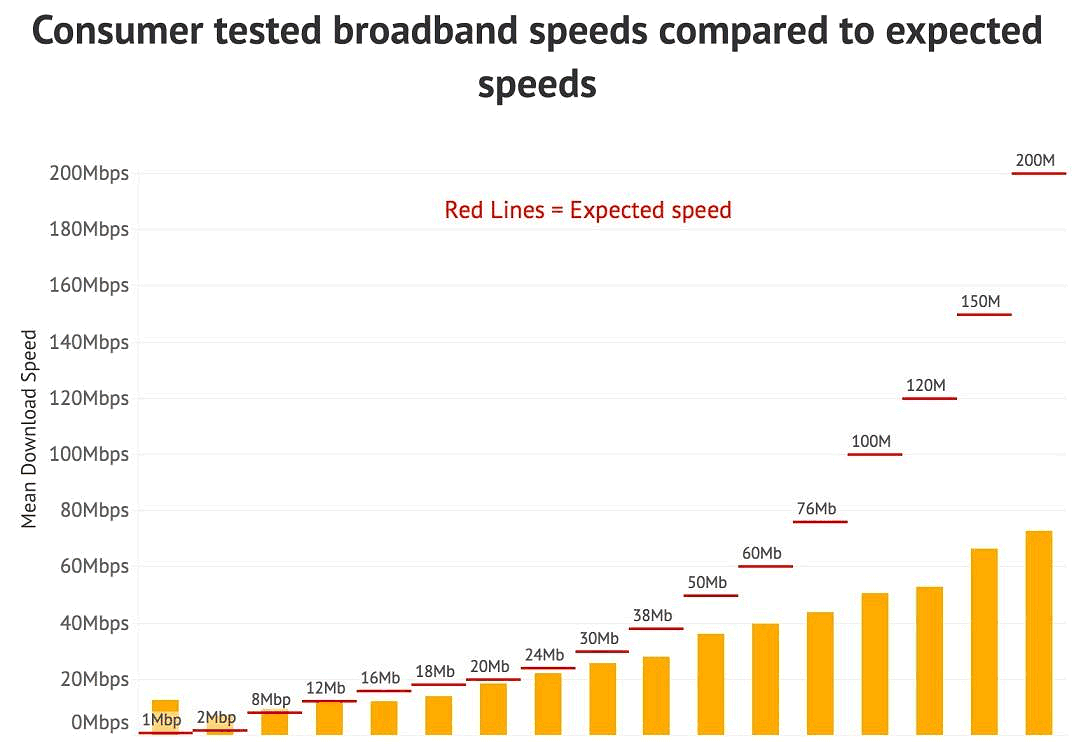Which? Finds Most UK People Not Getting the Broadband Speed they Expect
The problem of advertised vs real-world broadband performance expectations has been given new ammunition by consumer magazine Which? today. A study conducted by the group found that the overall speeds recorded in internet speedtests were only 58% of the speed that users were expecting to get.
The results, which are based on research that was conducted using data gathered via Speed Checker Ltd between January and March 2017 (i.e. analysis of 226,000 end-user speed tests), unsurprisingly revealed that the faster the expected speed, the bigger the expectation gap between what consumers thought they should receive and the actual speed recorded in the tests.
We note that Which?’s study also excluded mobile and exclusively business providers from their data.
Advertisement

Overall Which? believes that “far too many households” are potentially getting slower speeds than they thought they had paid for. For example, consumers expecting speeds in excess of 30Mbps (30Mbps to 500Mbps) were on average only able to get 54% of the speed they were expecting. Similarly users expecting speeds of between 10 to 30Mbps received 89% of what they expected.
Apparently only those expecting to get 10Mbps or slower were able to exceed their expected speed by 38%.
Alex Neill, Which? Managing Director of Home Services, said:
“People who think they have signed up for faster broadband speeds are the most likely to be disappointed, with our research showing many are generally getting speeds that are much slower than they expected.
Consumers need to regularly test their broadband speed to check they are getting the service they are paying for. If they aren’t they should contact their provider so that any issues with their service can be resolved.”
None of this will come as much of a surprise because most people subscribe to ADSL or hybrid “fibre” FTTC (VDSL2) broadband lines, which suffer from highly variable performance due to issues such as signal degradation over copper line distance and other forms of interference.
Advertisement
On top of that the current advertising rules only require ISPs to ensure that the headline speeds they promote are achievable by at least 10% of their customers (i.e. the fastest 10th percentile) and these figures should be preceded by an “up to” qualifier, as well as an explanation of any limitations that may hamper the connection.
However, we also have another layer of problems to consider when using data gathered from speedtests, such as the fact that the results can be impacted by issues like slow WiFi, poor home wiring, peak time testing and local network congestion (e.g. running a speedtest at the same time as somebody else is downloading a big file).
Furthermore all of the major ISPs should be giving new subscribers a more accurate personal estimate of their expected broadband line speed before they subscribe (this has been going on for a few years now), although Which?’s study doesn’t seem to consider that and only appears to factor the general advertised rate of a package (at least that’s how it appears from the above table).
Andrew Glover, Chair of the UK ISPA, said:
“ISPs are investing billions in upgrading infrastructure to deliver increased speeds and are committed to providing more accurate and personalised information to customers.
Recent Ofcom data shows that the average residential connection speeds has increased to 36Mbps in November 2016, up from 29Mbit/s in 2015. Continued investment from ISPs nationally, regionally and locally will continue to see speeds rise.
A number of factors can affect the actual speed received by an end user and this is why ISPs help manage broadband speeds expectations, including through a code of practice that provides a personalised speed estimate to new customers at point of sale and allows customers to exit a contract if they cannot achieve the speeds estimated.
In addition, upcoming changes to advertising rules from the ASA and CAP will improve how speeds are advertised. ISPA and its members are actively engaged in this process.”
As the Internet Service Providers Association (ISPA) hints above, the UK Advertising Standards Authority (ASA) is currently consulting upon a number of options that aim to improve how broadband speeds are advertised to consumers (details). The likely outcome of this is that some form of average (median) speed may be adopted.
Advertisement
However we suspect that there will always be a gap between expectation and reality, which is simply due to the fact that so many different factors can influence the speed you receive and not even blanketing the country in FTTH/P lines would overcome all of those ( although that would be lovely 🙂 ).
Mark is a professional technology writer, IT consultant and computer engineer from Dorset (England), he also founded ISPreview in 1999 and enjoys analysing the latest telecoms and broadband developments. Find me on X (Twitter), Mastodon, Facebook, BlueSky, Threads.net and Linkedin.
« Ookla Launch Global Monthly Broadband Speeds Report – UK at 49.22Mbps
















































Comments are closed